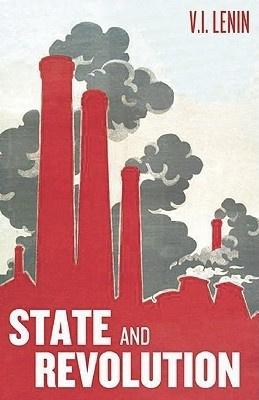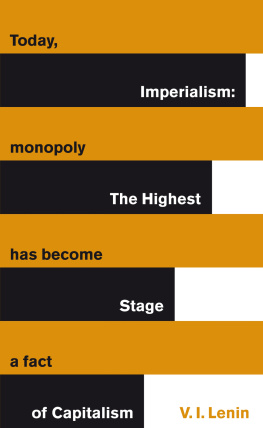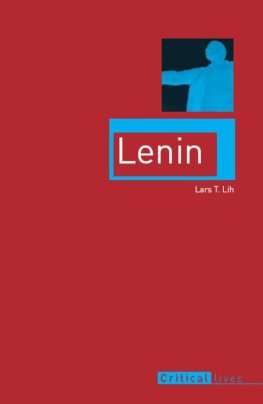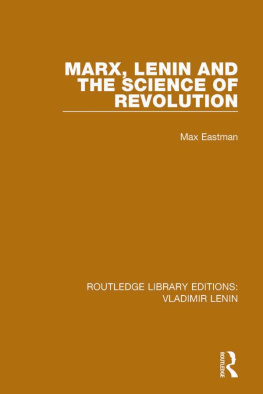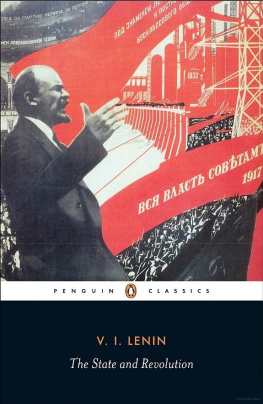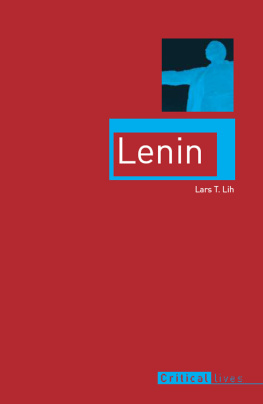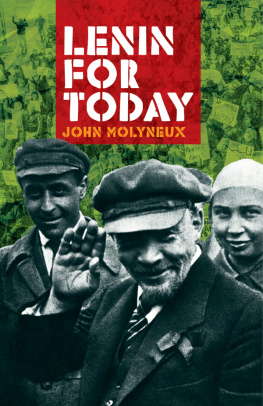Lenin - The State & Revolution
Here you can read online Lenin - The State & Revolution full text of the book (entire story) in english for free. Download pdf and epub, get meaning, cover and reviews about this ebook. genre: Politics. Description of the work, (preface) as well as reviews are available. Best literature library LitArk.com created for fans of good reading and offers a wide selection of genres:
Romance novel
Science fiction
Adventure
Detective
Science
History
Home and family
Prose
Art
Politics
Computer
Non-fiction
Religion
Business
Children
Humor
Choose a favorite category and find really read worthwhile books. Enjoy immersion in the world of imagination, feel the emotions of the characters or learn something new for yourself, make an fascinating discovery.
The State & Revolution: summary, description and annotation
We offer to read an annotation, description, summary or preface (depends on what the author of the book "The State & Revolution" wrote himself). If you haven't found the necessary information about the book — write in the comments, we will try to find it.
Lenin: author's other books
Who wrote The State & Revolution? Find out the surname, the name of the author of the book and a list of all author's works by series.
The State & Revolution — read online for free the complete book (whole text) full work
Below is the text of the book, divided by pages. System saving the place of the last page read, allows you to conveniently read the book "The State & Revolution" online for free, without having to search again every time where you left off. Put a bookmark, and you can go to the page where you finished reading at any time.
Font size:
Interval:
Bookmark:
V. I. Lenin
The question of the state is now acquiring particular importance both in theory and in practical politics. The imperialist war has immensely accelerated and intensified the process of transformation of monopoly capitalism into state-monopoly capitalism. The monstrous oppression of the working people by the state, which is merging more and more with the all-powerful capitalist associations, is becoming increasingly monstrous. The advanced countries - we mean their hinterland - are becoming military convict prisons for the workers.
The unprecedented horrors and miseries of the protracted was are making the people's position unbearable and increasing their anger. The world proletarian revolution is clearly maturing. The question of its relation to the state is acquiring practical importance.
The elements of opportunism that accumulated over the decades of comparatively peaceful development have given rise to the trend of social-chauvinism which dominated the official socialist parties throughout the world. This trend - socialism in words and chauvinism in deeds (Plekhanov, Potresov, Breshkovskaya, Rubanovich, and, in a slightly veiled form, Tsereteli, Chernov and Co. in Russia; Scheidemann. Legien, David and others in Germany; Renaudel, Guesde and Vandervelde in France and Belgium; Hyndman and the Fabians in England, etc., etc.) - is conspicuous for the base, servile adaptation of the "leaders of socialism" to the interests not only of "their" national bourgeoisie, but of "their" state, for the majority of the so-called Great Powers have long been exploiting and enslaving a whole number of small and weak nations. And the imperialist war is a war for the division and redivision of this kind of booty. The struggle to free the working people from the influence of the bourgeoisie in general, and of the imperialist bourgeoisie in particular, is impossible without a struggle against opportunist prejudices concerning the "state".
First of all we examine the theory of Marx and Engels of the state, and dwell in particular detail on those aspects of this theory which are ignored or have been distorted by the opportunists. Then we deal specially with the one who is chiefly responsible for these distortions, Karl Kautsky, the best-known leader of the Second International (1889-1914), which has met with such miserable bankruptcy in the present war. Lastly, we sum up the main results of the experience of the Russian revolutions of 1905 and particularly of 1917. Apparently, the latter is now (early August 1917) completing the first stage of its development; but this revolution as a whole can only be understood as a link in a chain of socialist proletarian revolutions being caused by the imperialist war. The question of the relation of the socialist proletarian revolution to the state, therefore, is acquiring not only practical political importance, but also the significance of a most urgent problem of the day, the problem of explaining to the masses what they will have to do before long to free themselves from capitalist tyranny.
The Author
August 1917
The present, second edition is published virtually unaltered, except that had been added to Chapter II.
The Author
Moscow
December 17, 1918
What is now happening to Marx's theory has, in the course of history, happened repeatedly to the theories of revolutionary thinkers and leaders of oppressed classes fighting for emancipation. During the lifetime of great revolutionaries, the oppressing classes constantly hounded them, received their theories with the most savage malice, the most furious hatred and the most unscrupulous campaigns of lies and slander. After their death, attempts are made to convert them into harmless icons, to canonize them, so to say, and to hallow their names to a certain extent for the "consolation" of the oppressed classes and with the object of duping the latter, while at the same time robbing the revolutionary theory of its substance, blunting its revolutionary edge and vulgarizing it. Today, the bourgeoisie and the opportunists within the labor movement concur in this doctoring of Marxism. They omit, obscure, or distort the revolutionary side of this theory, its revolutionary soul. They push to the foreground and extol what is or seems acceptable to the bourgeoisie. All the social-chauvinists are now "Marxists" (don't laugh!). And more and more frequently German bourgeois scholars, only yesterday specialists in the annihilation of Marxism, are speaking of the "national-German" Marx, who, they claim, educated the labor unions which are so splendidly organized for the purpose of waging a predatory war!
In these circumstances, in view of the unprecedently wide-spread distortion of Marxism, our prime task is to re-establish what Marx really taught on the subject of the state. This will necessitate a number of long quotations from the works of Marx and Engels themselves. Of course, long quotations will render the text cumbersome and not help at all to make it popular reading, but we cannot possibly dispense with them. All, or at any rate all they most essential passages in the works of Marx and Engels on the subject of the state must by all means be quoted as fully as possible so that the reader may form an independent opinion of the totality of the views of the founders of scientific socialism, and of the evolution of those views, and so that their distortion by the "Kautskyism" now prevailing may be documentarily proved and clearly demonstrated.
Let us being with the most popular of Engels' works, The Origin of the Family, Private Property and the State, the sixth edition of which was published in Stuttgart as far back as 1894. We have to translate the quotations from the German originals, as the Russian translations, while very numerous, are for the most part either incomplete or very unsatisfactory.
Summing up his historical analysis, Engels says:
"The state is, therefore, by no means a power forced on society from without; just as little is it 'the reality of the ethical idea', 'the image and reality of reason', as Hegel maintains. Rather, it is a product of society at a certain stage of development; it is the admission that this society has become entangled in an insoluble contradiction with itself, that it has split into irreconcilable antagonisms which it is powerless to dispel. But in order that these antagonisms, these classes with conflicting economic interests, might not consume themselves and society in fruitless struggle, it became necessary to have a power, seemingly standing above society, that would alleviate the conflict and keep it within the bounds of 'order'; and this power, arisen out of society but placing itself above it, and alienating itself more and more from it, is the state."
(pp.177-78, sixth edition)
This expresses with perfect clarity the basic idea of Marxism with regard to the historical role and the meaning of the state. The state is a product and a manifestation of the irreconcilability of class antagonisms. The state arises where, when and insofar as class antagonism objectively cannot be reconciled. And, conversely, the existence of the state proves that the class antagonisms are irreconcilable.
It is on this most important and fundamental point that the distortion of Marxism, proceeding along two main lines, begins.
On the one hand, the bourgeois, and particularly the petty-bourgeois, ideologists, compelled under the weight of indisputable historical facts to admit that the state only exists where there are class antagonisms and a class struggle, "correct" Marx in such a way as to make it appear that the gate is an organ for the reconciliation of classes. According to Marx, the state could neither have arisen nor maintained itself had it been possible to reconcile classes. From what the petty-bourgeois and philistine professors and publicists say, with quite frequent and benevolent references to Marx, it appears that the state does reconcile classes. According to Marx, the state is an organ of class rule, an organ for the oppression of one class by another; it is the creation of "order", which legalizes and perpetuates this oppression by moderating the conflict between classes. In the opinion of the petty-bourgeois politicians, however, order means the reconciliation of classes, and not the oppression of one class by another; to alleviate the conflict means reconciling classes and not depriving the oppressed classes of definite means and methods of struggle to overthrow the oppressors.
Font size:
Interval:
Bookmark:
Similar books «The State & Revolution»
Look at similar books to The State & Revolution. We have selected literature similar in name and meaning in the hope of providing readers with more options to find new, interesting, not yet read works.
Discussion, reviews of the book The State & Revolution and just readers' own opinions. Leave your comments, write what you think about the work, its meaning or the main characters. Specify what exactly you liked and what you didn't like, and why you think so.

